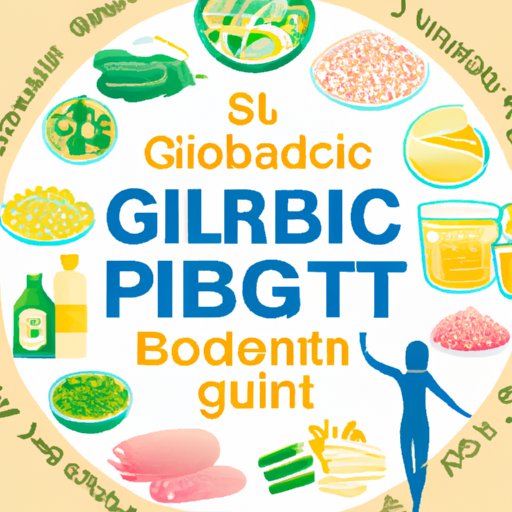Introduction
Gut health is an important part of overall health and wellbeing. It is the state of balance in the digestive system, which includes the stomach, small intestine, large intestine, and their associated organs. When the gut is healthy, it can help to improve digestion, boost immunity, and even affect mental health. However, when the gut is not functioning optimally, it can lead to a variety of unpleasant symptoms, such as bloating, gas, constipation, and diarrhea.
Eat a Balanced Diet Rich in Fiber, Prebiotics, and Probiotics
Eating a balanced diet is essential for promoting gut health. This means consuming a variety of whole foods, such as fruits, vegetables, lean proteins, and healthy fats. These types of foods are rich in dietary fiber, prebiotics, and probiotics, all of which are beneficial for the gut. Dietary fiber helps to keep the digestive system running smoothly, while prebiotics and probiotics support the growth of beneficial bacteria in the gut.
“A diet rich in prebiotic fibers, probiotics, and other nutrients is key for maintaining a healthy gut microbiome,” says Dr. Roshini Raj, gastroenterologist and professor at NYU Langone Medical Center. “By consuming a variety of plant-based foods, you can ensure that your gut is receiving the nourishment it needs to thrive.”
Some examples of foods high in fiber, prebiotics, and probiotics include apples, bananas, oats, lentils, beans, yogurt, sauerkraut, kimchi, and kefir.
Reduce Stress Levels
Stress has a significant impact on gut health. When we experience stress, our bodies produce cortisol, a hormone that can disrupt the delicate balance of microbes in the gut. This can lead to digestive issues, such as irritable bowel syndrome (IBS) and inflammatory bowel disease (IBD).
“It’s important to manage stress levels in order to maintain optimal gut health,” says Dr. Raj. “Engaging in relaxation techniques, such as yoga, meditation, and deep breathing, can help to reduce cortisol levels and protect the gut.”
Exercise Regularly
Exercise also plays an important role in promoting gut health. Physical activity helps to stimulate the digestive system and reduce inflammation, both of which can be beneficial for the gut. It can also help to reduce stress levels and improve overall wellbeing.
“Regular exercise can help to improve gut health by increasing circulation and stimulating the release of endorphins,” says Dr. Raj. “Low-impact activities, such as walking, swimming, and cycling, are especially beneficial for the gut.”
Avoid Processed Foods
Processed foods can be detrimental to gut health. They are often high in added sugars, unhealthy fats, and artificial ingredients, all of which can disrupt the balance of the gut microbiome. Processed foods can also cause inflammation, which can lead to digestive issues.
“It’s best to limit or avoid processed foods entirely,” says Dr. Raj. “Focus on eating whole foods, such as fruits, vegetables, nuts, seeds, and lean proteins.”
Limit Alcohol Intake
Alcohol consumption can also have a negative impact on gut health. It can increase inflammation and disrupt the balance of beneficial bacteria in the gut. For this reason, it’s important to limit alcohol intake in order to maintain optimal gut health.
“Moderate alcohol consumption is generally considered to be up to one drink per day for women and two drinks per day for men,” says Dr. Raj. “It’s best to avoid binge drinking, as this can have a more significant impact on gut health.”
Get Enough Sleep
Getting enough sleep is essential for promoting gut health. Sleep helps to regulate hormones, reduce inflammation, and restore balance to the gut microbiome. It also helps to reduce stress levels, which can have a positive effect on the digestive system.
“Adults should aim for seven to nine hours of sleep each night,” says Dr. Raj. “Establishing a consistent sleep routine can help to ensure that you’re getting the rest you need to support gut health.”
Take Supplements to Support Gut Health
In addition to eating a balanced diet and engaging in regular physical activity, taking supplements can be beneficial for gut health. Some supplements, such as probiotics and omega-3 fatty acids, can help to restore the balance of beneficial bacteria in the gut. Others, such as fiber and digestive enzymes, can help to improve digestion and reduce gastrointestinal symptoms.
“Supplements can be a great way to support gut health,” says Dr. Raj. “However, it’s important to talk to your doctor before taking any supplements, as they may interact with medications or other conditions.”
Conclusion
Promoting gut health is essential for overall health and wellbeing. Eating a balanced diet, reducing stress levels, exercising regularly, avoiding processed foods, limiting alcohol intake, getting enough sleep, and taking supplements can all help to support gut health. If you are concerned about your gut health, it’s best to speak to your doctor for further advice and guidance.
For more information about promoting gut health, visit the National Institute of Diabetes and Digestive and Kidney Diseases website.
(Note: Is this article not meeting your expectations? Do you have knowledge or insights to share? Unlock new opportunities and expand your reach by joining our authors team. Click Registration to join us and share your expertise with our readers.)
